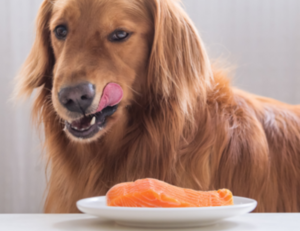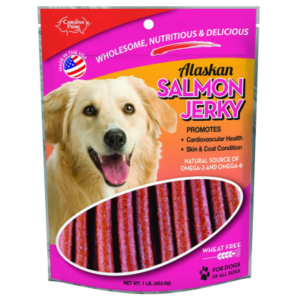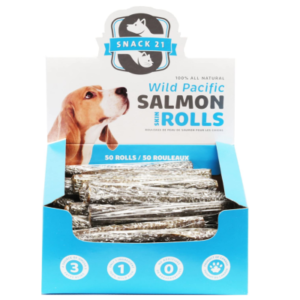 Can Dogs Eat Salmon?
Can Dogs Eat Salmon?
Can dogs eat salmon? Salmon is a nutritious nutrient-rich delicacy for humans. If you are wondering whether it applies to dogs, the simple answer is YES. Like us, our canine friends require high-quality foods to have a robust immunity, lean muscles, and healthy life. Every dog owner wants to give their beloved pup the best when it comes to nutrition. You won’t go wrong feeding your best friend salmon. Salmon is a popular type of fish and is regarded as a superfood for humans because it is loaded with beneficial fats and nutrients. It is also a superfood for dogs.
However, the salmon needs to be prepared properly before being fed to the dogs. When served right salmon will be a great and valuable addition to your dog’s regular diet. Salmon is also a good alternative if your dog has developed a sensitivity to common protein sources like poultry. As a precaution, raw salmon should be avoided as it contains bacteria which can be problematic. Nonetheless, there are many methods of cooking salmon but the less oil and butter that is used, the healthier it will be for your furry friend.
Benefits of Salmon to Dogs
Salmon contains many nutrients that are beneficial to the health of your dog. Key nutrients present in salmon include essential fatty acids that help maintain healthy skin and a radiant coat, vitamins such as A, D, and B, and traces of minerals like zinc, magnesium, and potassium. In a nutshell, salmon is a micronutrient-rich package. The benefits of these nutrients are:
- Helps in brain development in fetuses of expectant dogs and assist older dogs to concentrate better
- Regulates and sustains the immune system as your dog doesn’t need to waste energy fighting against conditions such as allergies
- Reduces inflammation that can result in conditions such as arthritis
- Leads a shiny coat and healthy skin as it balances moisture on the skin
- Cure or prevent skin allergies a sit builds a strong cell barrier which prevents reactions when they come in contact with allergens such as dust, grass, or pollen
- Helps with Inflammatory Bowel Disease which is a condition that occurs when inflammatory cells invade the stomach or intestines leading to chronic gastrointestinal symptoms such as diarrhea and vomiting
- Helps to fight against cancer by slowing down the growth of cancer cells as soon as they start spreading. It also helps with situations triggered by cancer such as cachexia.
- Helps produce more collagen in the dog’s system
- Promotes healthy weight loss in dogs that are overweight
- Fights heart disease and lowers blood pressure and triglycerides
- Provides support for dogs with kidney disease and issues
- Improves cognitive function in dogs that are older
- Helps reduce joint issues in dogs that are older as it helps in the reduction of inflammation and stiffness in the joints
- The amino acids in the salmon are essential in keeping dogs healthy and active
Risks of Salmon to Dogs
All dog foods should be in moderation. You should also consult your vet always before changing your dog’s diet. It is also very important to focus on how you prepare the salmon before feeding it to your dog. Make sure that you don’t feed your dog raw or undercooked salmon. This is because raw salmon can contain parasites and bacteria. The specific bacteria causes salmon poisoning to your dog leading to fatal results. The salmon can also contain a flat, worm-like parasite called a fluke.
Signs of Salmon Poisoning in Dogs include:
- Dehydration
- Fever
- Weakness and lethargy
- Extreme weight loss
- Vomiting and diarrhea
- Swelling in lymph nodes
- Discharge from eyes and nose
- Depression
- Loss of appetite
What Do if your Dog has Salmon Poisoning
The symptoms can vary so whenever you notice any of the above signs in your four-legged friend, take him to the vet right away. The vet is likely to have a fecal sample to detect the parasite’s eggs within the feces or a needle sample from a swollen lymph node shows the diagnosis for salmon poisoning. Treatment for salmon poisoning is pretty straightforward if detected in time. There are higher chances of survival if your dog gets proper treatment sooner. The veterinarian will probably prescribe an antibiotic regiment to kill the rickettsia microorganisms that caused the poisoning and a dewormer to kill the parasites. In case the dog is dehydrated, he will be given intravenous fluid.
How to Feed Salmon to Your Dog
Good Treats
-
Salmon Jerky Dog Treats
These dog treats are made in a similar way that beef and chicken-based treats are whereby a paste is made by mixing protein with fillings and flavorings. The paste is then baked or formed into uniform treats for your dog to eat. These do contain salmon but are not necessarily the best choice as intensive processing can reduce some nutritional benefits. They also contain grains that cause stomach sensitivities and allergies in some dogs.
Our Top Pick: Carolina Prime Pet Alaskan Salmon Jerky Dog Treats
 These mouthwatering jerky treats are formulated with real Alaskan Salmon and chicken. The treats are suitable for dogs of all breeds and ages. The treats have a soft texture so they are easy on your pup’s gums. They are easily broken down making them ideal for small dogs and as treats during training. The treats are grain-free making them ideal for pups with allergies and sensitivities. Since these jerky dog treats reduce tartar and plaque build-up they are useful in promoting the health of gums and teeth.
These mouthwatering jerky treats are formulated with real Alaskan Salmon and chicken. The treats are suitable for dogs of all breeds and ages. The treats have a soft texture so they are easy on your pup’s gums. They are easily broken down making them ideal for small dogs and as treats during training. The treats are grain-free making them ideal for pups with allergies and sensitivities. Since these jerky dog treats reduce tartar and plaque build-up they are useful in promoting the health of gums and teeth.
-
Salmon Skin Dog Treats
Salmon skin is safe for dogs to eat whether it comes off a fillet you have just cooked yourself or from a bag of dried salmon skin dog treats. However, ensure that the skin hasn’t been cooked with harmful ingredients or oils. Dogs may have food allergies or some sensitivities to some of the extra ingredients used in the cooking process as much as they love eating your scraps. Besides, be selective about how often you feed your dog these types of treats as the salmon skin is very fatty and can lead to canine obesity. They may also be a bit stinky and can also leave an oily residue on carpets or furniture.
Our Top Pick: Snack 21 Salmon Skin Rolls Dog Chews
 These are a favorite treat for dogs. Snack 21 Salmon Skin rolls are perfectly formulated to provide a wholesome and nutritious snack to your beloved canine companion. Besides they are delicious to appeal to your pup. Made with 100% natural ingredients, the treats have no by-products, preservatives, or artificial flavors that have no value to dogs. The treats are rich in Omega-3 fatty acids, natural vitamins and minerals. Also, the high protein content is very beneficial to your canine friend.
These are a favorite treat for dogs. Snack 21 Salmon Skin rolls are perfectly formulated to provide a wholesome and nutritious snack to your beloved canine companion. Besides they are delicious to appeal to your pup. Made with 100% natural ingredients, the treats have no by-products, preservatives, or artificial flavors that have no value to dogs. The treats are rich in Omega-3 fatty acids, natural vitamins and minerals. Also, the high protein content is very beneficial to your canine friend.
Better Treats: Dried Salmon Dog Treats
This dog treat is safe for your dog. Dried salmon dog treats are made from boneless fillets through a drying process that makes the dog treats free of any parasites that could cause salmon poisoning. These treats are a good choice for supplementing your four-legged friend’s diet but can have the same issues as salmon skin treats as they can be very stinky once the dog begins eating them and can leave an oily residue on your hands or furniture.
Best Treats: Dried Salmon Dog Treats
These are a favorite for both dogs and dog owners. These treats keep the mess, smell, and oily residue to a minimum, while the limited ingredient formulation increases the nutrition profiles of the treats.
You may also like: Best Dog Treat Bags
Preparation Types for Salmon
The preparation of salmon depends on how it is being used. For instance, feeding it as part of a meal is different compared to using it as a treat. There three different preparation types of salmon for dogs which are:
- Freeze-dried salmon
Free-drying is a process that freezes away the moisture from the salmon. It is very effective at retaining the original nutrients and flavors found in the salmon.
- Dehydrated salmon
Dehydrated salmon has the moisture removed from it. It also has bacteria removed. This makes it safe even though it has not been necessarily cooked. This type has the added benefit of longer shelf life of about 12 to 18 months. Besides, it contains no germs or mess and comes with all flavor and nutrition. It also contains only one ingredient that is all-natural which is the wild-caught salmon. Nonetheless, it contains no sugars or fillers.
- Cooked salmon
Grilled, poached, or broiled salmon is perfectly all right for your dog as long as it is not prepared with harmless ingredients. Avoid adding sugars, sauces, garlic, and other spices. Additionally, there are many brittle and tiny bones inside salmon. It is important to ensure that the salmon that you give your dog is boneless to prevent any scraping of the esophagus causing choking hazards or damage to their digestive systems.
Choose fresh boneless fillets as they are less likely to harbor small bones. But be sure to inspect for tiny bones before cooking. Then poach, grill, roast, steam, or bake with no oil, salt, and pepper, or other seasonings like garlic or onions. A proper serving of salmon to your pup should not be more than 100 grams per ten pounds of their body weight. If you intend to make salmon a regular part of your dog’s diet, feed him a portion a week as it is enough to maximize all of its health benefits.
See Also: Best Supplements for Dog Shedding
Conclusion
Salmon is very beneficial to the nutrition and health of dogs. It supports the immune system, decreases inflammation, and leads to a shiny and healthy coat. A salmon serving is a great source of protein. Besides, salmon is a common ingredient in high-quality dog foods. However, it is important to note that some dogs may not react well to salmon especially if they are not used to it. Eating salmon may lead to some side effects due to dietary change. The side effects include diarrhea and loose stool and vomiting. The good thing is that it is typically self-limited and resolves once the dog adjusts to the new food.
See Also: Can my dog eat strawberries.
